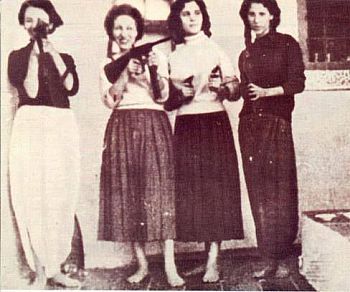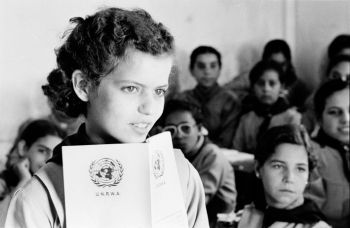News
Exhibition and webinar celebrate the role and memory of women anti-colonial resistance fighters in Algeria
Posted on behalf of: School of Media, Arts and Humanities
Last updated: Wednesday, 25 November 2020
The Centre for Photography and Visual Culture at the University of Sussex and the Middle East and North Africa Centre at Sussex are co-hosting a photographic exhibition exploring the complex histories of the Algerian women who fought in the Algerian War of Liberation from 1954–1962. A webinar on 25 November with the photographer, Nadia Makhlouf, will also explore this work further.
The exhibition has been curated by Professor Martin Evans (Sussex) and Dr Sarah C. Dunstan (Queen Mary University of London).
‘El Moudjahidate: Invisible to Visible – The Role and Memory of Women Anti-Colonial Resistance Fighters in Algeria’ by Nadja Makhlouf explores the complex histories of the Algerian women who fought in the National Liberation Front (FLN) and Algerian Communist Party (PCA) during the Algerian War of Liberation from 1954–1962.
These women not only participated as soldiers, nurses and doctors but they also provided the crucial infra-structures of resistance – food, shelter, intelligence – that underpinned Algerian military resistance in the mountains and countryside.
Although the role of women is a key dimension of Gillo Pontecorvo’s 1966 film Algerian-Italian film The Battle of Algiers, and although this role has been recovered in some measure by the recent brilliant work of Ryme Seferdjeli and Natalya Vince, much of this history remains hidden.
Nadja Makhlouf’s remarkable project, therefore, addresses this continuing lacunae. Through a series of black and white diptychs, juxtaposing photographs of the women from the anti-colonial war period with contemporary portraits taken by Nadja Makhlouf, the project enacts a complex dynamic between the past and the present. It poses complex questions about female agency, historical experience and role of memory within contemporary Algeria as well as the wider Middle East and North African region.
The Sussex Resistance Network gave financial support that made this exhibition possible.
A further webinar (30 November) explores the challenges of carrying out historical research on Palestinian refugees.
https://universityofsussex.zoom.us/j/93055747478
Speaker: Nadja Makhlouf in conversation with Prof Martin Evans
Part of the series: MENACS webinar series

https://universityofsussex.zoom.us/j/93055747478
Nadja Makhlouf in conversation with Martin Evans on the photo exhibition "El Moudjahidate, Invisible to Visible", displayed and curated on the website of the Middle East and North Africa at Sussex (MENACS).
Nadja Makhlouf is a French-Algerian photographer and video maker (film director). Her work questions diverse aspects of historical memory, history, social issues and notably the status of women in Algeria. After studying documentary film making at Aix-Marseille University, she is engaged on a long term project exploring the status of women in Algeria, each consisting of a photographic exhibition and a documentary film. The first of these presents photographic portraits of the Kabyle women in today's Algeria. Allah Ghaleb, the film that accompanies it, explores the private day to day life of these women. This film won the Audience Award at the festival Look at the World Cinema in Rouen, France, 2012. Her exhibition presented here – ‘El Moudjahidate: Invisible to Visible: The Role and Memory of Women Anti-Colonial Resistance Fighters in Algeria’ – is a further part of this project.
Researching Palestinian Refugee History
https://universityofsussex.zoom.us/j/91026486999
Speaker: Dr Anne Irfan
Part of the series: MENACS webinar series

Dr Anne Irfan (Oxford) in conversation with Dr Jacob Norris (Sussex) on the challenges of carrying out historical research on Palestinian refugees.